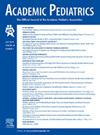针对美国华人移民父母的文化适应性早期肥胖预防计划的婴儿喂养结果。
IF 2.8
3区 医学
Q1 PEDIATRICS
引用次数: 0
摘要
研究目的研究设计:研究设计:一项前瞻性准实验研究,针对肥胖预防项目的社区参与式多阶段文化调整,该项目在一家联邦合格医疗中心开展,服务对象为移民华裔美国人亲子二人组(N=298)。在一组历史对照组中,我们评估了 6 个月大婴儿的早期喂养方式(母乳喂养、含糖饮料摄入量),然后评估了 12 个月大婴儿的早期固体食物喂养方式(奶瓶断奶、水果、蔬菜、含糖或含盐零食摄入量)。实施后,我们在 6 个月和 12 个月时对干预队列组中的这些做法进行了评估。我们采用横截面分组比较和调整回归分析来评估组间差异:6 个月时,干预组不摄入含糖饮料的几率增加(aOR:5.69 [95% CI:1.65, 19.63],p=0.006)。12 个月时,干预组不摄入含糖饮料的几率也有所提高(aOR:15.22 [95% CI:6.33, 36.62],P=0.006):针对低收入华裔移民家庭的以初级保健为基础的预防肥胖教育计划的文化适应性与某些健康的婴儿喂养方式有关。未来的研究应评估更深入的干预措施的文化适应性,以更好地应对复杂的喂养方式,如母乳喂养,并评估长期体重结果。本文章由计算机程序翻译,如有差异,请以英文原文为准。
Infant Feeding Outcomes From a Culturally-Adapted Early Obesity Prevention Program for Immigrant Chinese American Parents
Objective
To examine whether a cultural adaptation of an early childhood obesity prevention program promotes healthy infant feeding practices.
Methods
Prospective quasi-experimental study of a community-engaged multiphasic cultural adaptation of an obesity prevention program set at a federally qualified health center serving immigrant Chinese American parent-child dyads (N = 298). In a group of historical controls, we assessed early infant feeding practices (breastfeeding, sugar-sweetened beverage intake) in 6-month-olds and then the same practices alongside early solid food feeding practices (bottle weaning, fruit, vegetable, sugary or salty snack consumption) in 12-month-olds. After implementation, we assessed these practices in an intervention cohort group at 6 and 12 months. We used cross-sectional groupwise comparisons and adjusted regression analyses to evaluate group differences.
Results
At 6 months, the intervention group had increased odds of no sugar-sweetened beverage intake (aOR: 5.69 [95% confidence interval (CI): 1.65, 19.63], P = .006). At 12 months, the intervention group also had increased odds of no sugar-sweetened beverage intake (aOR: 15.22 [95% CI: 6.33, 36.62], P < .001), increased odds of bottle weaning (aOR: 2.34 [95% CI: 1.05, 5.23], P = .03), and decreased odds of sugary snack consumption (aOR: 0.36 [0.18, 0.70], P = .003). We did not detect improvements in breastfeeding, fruit, vegetable, or salty snack consumption.
Conclusions
A cultural adaptation of a primary care-based educational obesity prevention program for immigrant Chinese American families with low income is associated with certain healthy infant feeding practices. Future studies should evaluate cultural adaptations of more intensive interventions that better address complex feeding practices, such as breastfeeding, and evaluate long-term weight outcomes.
求助全文
通过发布文献求助,成功后即可免费获取论文全文。
去求助
来源期刊

Academic Pediatrics
PEDIATRICS-
CiteScore
4.60
自引率
12.90%
发文量
300
审稿时长
60 days
期刊介绍:
Academic Pediatrics, the official journal of the Academic Pediatric Association, is a peer-reviewed publication whose purpose is to strengthen the research and educational base of academic general pediatrics. The journal provides leadership in pediatric education, research, patient care and advocacy. Content areas include pediatric education, emergency medicine, injury, abuse, behavioral pediatrics, holistic medicine, child health services and health policy,and the environment. The journal provides an active forum for the presentation of pediatric educational research in diverse settings, involving medical students, residents, fellows, and practicing professionals. The journal also emphasizes important research relating to the quality of child health care, health care policy, and the organization of child health services. It also includes systematic reviews of primary care interventions and important methodologic papers to aid research in child health and education.
 求助内容:
求助内容: 应助结果提醒方式:
应助结果提醒方式:


